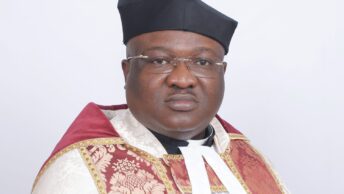By Ven. David Nwanekpe
Rector, Anglican Church of the Holy Spirit, Bronx, USA 🇺🇸
There is an urgent need to address some disturbing practices in the Nigerian Church. This call is not to criticize the Body of Christ, but to draw attention to certain habits and traditions that are slowly draining the life out of our members and weakening our witness in the world.
1. The Over-Monetization of Worship
Today, many people no longer feel free in church because of the excessive financial demands placed on them. On an average Sunday, a worshipper may be asked to give up to four or five different offerings—tithes, thanksgiving, project offering, mission offering, seed offering, and sometimes even pastors’ appreciation.
The issue is not giving to God—because God loves a cheerful giver—but the manner and pressure under which these offerings are demanded.
Publicly calling out individuals who haven’t given, or forcing people to pledge what they haven’t planned for, only embarrasses worshippers. Sadly, the offering moment now often overshadows the sermon.
❌ This is not the church Jesus Christ died for.
2. The Painful Burden Placed on the Bereaved
It is disheartening how the church treats families of the deceased. Instead of offering comfort, many churches present a long list of financial demands—burial dues, thanksgiving levies, outstanding donations, and other requirements.
In some cases, the body is refused burial rites because of unpaid fees. This is heartbreaking.
🎙️ Chude Jideonwo, a Nigerian media personality, once shared how a friend’s father’s burial was delayed by the church because all levies had not been paid.
Such practices bring shame to the name of the church. Funerals should be moments of care, not fundraising.
3. Diocesan Levies and Parish Struggles
At the parish level, many priests are under intense pressure due to unending financial targets from their diocesan headquarters.
Funds demanded for synods, anniversaries, assessments, and developmental levies push clergy to adopt uncomfortable fundraising tactics—placing the burden on already struggling members.
When ministry becomes centered on meeting financial quotas rather than caring for souls, then something has gone wrong.
4. The Root Problem: Ordination Without Proper Formation
Behind these visible challenges lies a deeper issue: the process of ordination itself.
Today, many of our problems stem from poor training, formation, and selection of those called into ordained ministry.
In the past:
🔹 Bishops were directly involved in theological education.
🔹 Dioceses paid for candidates’ training.
🔹 Strict curriculum and doctrinal formation were enforced.
But now, candidates often pay their way through loosely regulated institutions, sometimes with no formal liturgical or doctrinal training.
Some are ordained within six months or less—without scrutiny or mentorship. We are, in many cases, ordaining people who have no business at the altar.
🗣️ Dr. Sam Amadi, former chairman of NERC, once said:
“The crisis of Nigeria is not in leadership alone but in the formation of leaders.”
The same crisis exists in our clergy today.
5. A Call to Return to Our Roots
If we must see revival and reform, we must return to the roots.
✅ Dioceses must take ownership of clergy formation.
✅ Bishops should select candidates based on calling, character, and competence—not politics or tribe.
✅ Ordination should follow robust academic, spiritual, and pastoral training.
✅ Candidates should be sent on field missions before ordination.
We must also:
- Stop using the pulpit as a fundraising stage.
- Teach and pastor people well so they give willingly—not by manipulation.
- Offer ministry with compassion, especially during funerals—not humiliation.
Let the Church be known as a place of healing, comfort, and truth—not as a place of hidden fees and silent pain.
In Conclusion
This is not just a call for change—it is a call for repentance.
We must repent of the ways we have:
- Misrepresented Christ
- Commodified the altar
- Placed heavy loads on the backs of God’s people
It is not too late to return.
Let the Church be the Church again.
Let us raise a generation of well-trained priests who serve in truth and humility.
Let us lift burdens, not add to them.
Let the altar be a place of prayer, not pressure.
Let the Body of Christ be healed.
God bless His Church. Amen.
Happy Sunday after Ascension and Happy New Month of June. Six months gone already—may the second half of the year bring revival and renewal.
Ven. David Nwanekpe
Rector, Anglican Church of the Holy Spirit, Bronx, USA 🇺🇸








